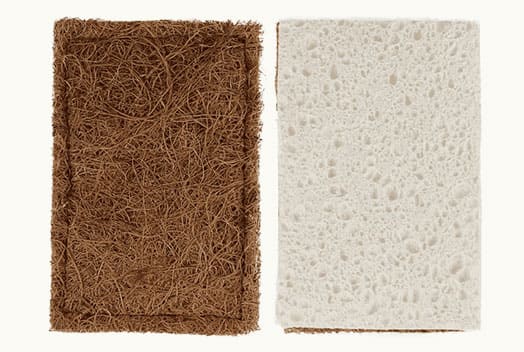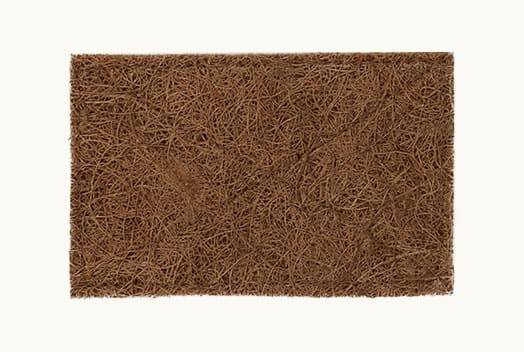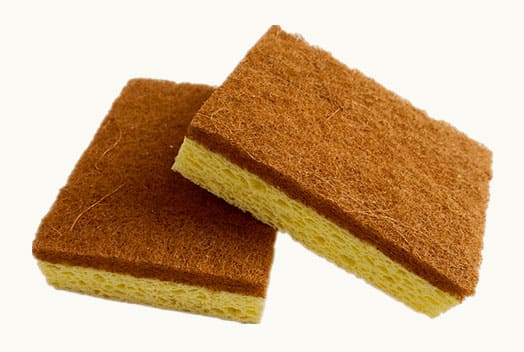Coconut Fiber Scrubber and Wood Pulp Cellulose Sponge Pads
100% Biodegradable
- Customize different sizes
- Heavy duty cleaning scrubber
- Fast delivery

Coconut Fiber & Wood Pulp Cellulose Sponge
Coconut fiber and wood pulp cellulose sponges are eco-friendly cleaning options. Coconut fiber, derived from coconut husks, makes durable scrubbers and scouring pads for tough cleaning. Wood pulp cellulose sponges, made from tree fibers, are versatile and highly absorbent, perfect for various cleaning tasks. Both options are effective and sustainable.
- Eco-friendly: Made from natural, biodegradable coconut fibers.
- Durable: Long-lasting and resistant to heavy scrubbing.
- Versatile: Effective for cleaning dishes, countertops, and floors.
- Antibacterial: Naturally reduces bacterial buildup.
- Safe: Non-toxic and chemical-free.

Coconut Fiber Scrub Pad
The Coconut Fiber Scrub Pad is made from repurposed coconut husks, processed for durability and enhanced with natural rubber latex. It’s eco-friendly, durable, versatile, and naturally antibacterial. More abrasive than sponges but gentler than steel wool, its porous design prevents mold growth, ensuring long-lasting use.
- Eco-friendly: Made from recycled coconut husks.
- Durable: Infused with natural rubber latex for strength.
- Antibacterial: Naturally resists bacterial growth.
- Versatile: Effective for various cleaning tasks.
- Long-lasting: Porous design prevents mold, ensuring longevity.

Coconut sponge
-Hemming around-

Coconut sponge pad
-Cross seam-

Coconut round pad
-No Hemming-

Coconut Fiber pad
-No Hemming-

Coconut Fiber pad
-Hemming around-

Coconut Fiber pad
-Cross seam-

Coconut cellulose fiber cleaning sponge

Coconut cellulose fiber cleaning sponge
COCONUT
100% Biodegradable
Natural Material
Enhance your catalog with our customizable Coconut Fiber & Wood Pulp Sponge and Scrub Pad.
Cleaning and Usage Instructions
Cleaning a coconut coir scrub sponge is simple and efficient, thanks to its unique material properties:
- Oil and Dirt Separation: The wood pulp cellulose surface allows oil and dirt to separate upon contact with water, ensuring that stains do not remain on the fibers.
- Rinse Clean with Water: Simply rinse the sponge with clean water, and it will be thoroughly clean without the need for excessive cleaning agents.
- Air Dry Naturally: After rinsing, allow the sponge to air dry naturally. It does not harbor bacteria easily.
- Absorbent and Quick-Drying: The sponge is highly absorbent and dries quickly, reducing bacterial growth.
- Mold and Mildew Resistant: It does not become moldy or sticky with use.
- Porous Coconut Coir Surface: The porous structure of the coconut coir surface promotes air circulation, preventing mold growth.
By following these steps, you can keep your coconut coir scrub sponge clean, dry, and free from bacteria, ensuring it remains effective and hygienic for longer periods.
Coconut coir, derived from coconut husks, is a versatile and eco-friendly material. Here are a few common uses:
- Gardening and Horticulture:
- Mix with soil to improve aeration and water retention.
- Use as a seed starting medium or in hydroponics.
- Animal Bedding:
- Suitable for pet and livestock bedding, providing comfort and odor control.
- Cleaning and Scrubbing:
- Used to make natural scrubbers and cleaning pads.
- Erosion Control:
- Employed in coir logs and mats to stabilize soil and promote vegetation.
- Composting:
- Add to compost to balance the carbon-to-nitrogen ratio.
Kare Coconut Coir Scrubber Manufacturing Process
- Collecting Coconut Husks:
- After harvesting, coconut husks are collected. These husks, usually considered waste, are repurposed here.
- Processing Coconut Husks:
- The husks are cleaned and processed to remove impurities, retaining only the durable fibers.
- Processing Coconut Fibers:
- The treated fibers are woven or pressed into the desired shape and thickness for scrubbers.
- Adding Natural Rubber Latex:
- Natural rubber latex, collected from rubber trees, is added to enhance elasticity and durability.
- Sewing and Fixing:
- The scrubber parts are sewn together with natural cotton threads, ensuring stability and ease of use.
- Final Processing and Packaging:
- After quality inspection, the finished scrubbers are cleaned and packaged for sale.
Crafting Methods
Production Process for the Coconut Scouring Pad:
Coconut Tree:
- Coconuts grow on coconut trees.
Harvesting Coconuts:
- Mature coconuts are harvested from the coconut trees.
Processing Coconut Husk:
- The outer husk of the coconuts is removed, leaving the tough fiber part.
Coconut Fiber:
- The coconut husk is processed into fibers.
Natural Rubber Latex:
- Natural rubber latex is collected from rubber trees.
Coconut Scouring Pad:
- Coconut fibers are combined with natural rubber latex to create the coconut scouring pad.
Production Process for the Wood Pulp Sponge Block:
Natural Wood:
- The raw material is natural wood.
Wood Pulp Blocks:
- The wood is processed into wood pulp blocks.
Wood Pulp Fiber:
- The wood pulp blocks are further processed into fine wood pulp fibers.
Wood Pulp Sponge Block:
- The wood pulp fibers are processed into sponge blocks, creating a soft and highly absorbent material.
Final Product:
The coconut scouring pad is combined with the wood pulp sponge block to create a dual-layer cleaning sponge. This product features the durability of coconut fibers and the softness and high absorbency of the wood pulp sponge, making it suitable for various cleaning purposes.
The Production Process of "Coconut Husk Scrubbers" is as follows:
Collecting Coconut Husks:
- After harvesting, coconut husks are removed. These husks are typically considered waste but are repurposed here.
Processing Coconut Husks:
- The husks are cleaned and processed to remove impurities and excess parts, leaving only the durable fibers.
Processing Coconut Fibers:
- The treated coconut fibers are woven or pressed into the appropriate shape and thickness for scrubbers.
Adding Natural Rubber Latex:
- Natural rubber latex is added to the coconut fibers to enhance elasticity and durability. This latex is collected from rubber trees through tapping.
Sewing and Fixing:
- The scrubber parts are sewn together with natural cotton threads, ensuring the structure is stable and easy to use.
Final Processing and Packaging:
- The completed scrubbers undergo quality inspection, are cleaned, and then packaged for sale.
Through this process, coconut husk scrubbers effectively utilize natural coconut husks, combining them with natural rubber and cotton threads to ensure the product is eco-friendly, efficient, and durable.
Product Description and Definition
Coconut Coir Scrub Sponge
Material:
- Coconut Coir: The primary material is coir, which is the fibrous husk found between the hard shell and the outer coat of a coconut. This coir is processed into a rough, durable fiber.
- Additional Layers: Some versions of the scrub sponge might be combined with other materials, such as a cellulose sponge layer, to enhance its functionality.
Eco-Friendly:
- Biodegradable: Coconut coir is a natural, biodegradable material, making the scrub sponge an environmentally friendly alternative to synthetic sponges.
- Sustainable: The use of coconut coir promotes the use of renewable resources, as coconuts are abundant and their husks are often a byproduct of other industries.
Durability:
- Long-Lasting: Coconut coir fibers are known for their strength and durability, making the scrub sponge effective for heavy-duty cleaning tasks.
Usage:
- Cleaning: The rough texture of the coir is excellent for scrubbing and removing tough stains, grime, and dirt from various surfaces.
- Versatility: It can be used in kitchens for cleaning dishes, countertops, and sinks, as well as in bathrooms and other areas where scrubbing is required.
Maintenance:
- Easy to Clean: The sponge can be rinsed and air-dried after use. It should be kept dry between uses to prevent mold and extend its lifespan.
Benefits
- Natural Abrasive: The coarse nature of the coir fibers makes it an effective scrubbing tool without being too harsh on surfaces.
- Chemical-Free: It doesn’t require any chemical treatments to be effective, contributing to a healthier cleaning environment.
- Cost-Effective: While it may have a slightly higher initial cost compared to synthetic sponges, its durability and eco-friendly nature make it a cost-effective choice in the long run.
Horticulture and Gardening
Soil Amendment:
- Improves Soil Structure: Coir improves soil aeration and water retention, making it an excellent soil amendment.
- pH Neutral: It has a near-neutral pH, which is beneficial for most plants.
Growing Medium:
- Hydroponics: Coir is widely used in hydroponic systems as a growing medium due to its excellent water retention and drainage capabilities.
- Seed Starting: It provides an ideal environment for germinating seeds.
Mulch:
- Weed Control: Coir mulch helps suppress weed growth.
- Moisture Retention: It retains moisture in the soil, reducing the need for frequent watering.
Animal Bedding
- Comfortable and Absorbent: Coconut coir is used as bedding for pets and livestock because it is comfortable and highly absorbent.
Erosion Control
- Erosion Mats and Blankets: Coir is used in erosion control products to stabilize soil and prevent erosion on slopes and riverbanks.
Filtration
- Water Filtration: Coir is used in water filtration systems to remove impurities and improve water quality.
Cleaning Products
- Scrub Brushes and Sponges:
- Natural Abrasive: Coir fibers are used in scrub brushes and sponges for cleaning due to their abrasive yet non-damaging nature.
- Eco-Friendly: These products are biodegradable and environmentally friendly.
Crafting and Home Decor
- Rope and Mats: Coir fibers are used to make ropes, doormats, and various home decor items.
- Bristles for Brooms: Coir is used to make bristles for brooms and brushes.
Packaging
- Biodegradable Packaging: Coir is used as a sustainable alternative to plastic packaging materials, especially for fragile items.
Benefits of Coconut Coir
Sustainable:
- Renewable Resource: Coir is a byproduct of the coconut industry, making it a sustainable and renewable resource.
- Biodegradable: It decomposes naturally, reducing environmental impact.
Water Retention:
- Efficient Water Use: Coir retains water well, reducing the need for frequent watering in gardening applications.
Eco-Friendly:
- Reduced Chemical Use: It is naturally pest-resistant, reducing the need for chemical pesticides in gardening.
- Environmentally Safe: Coir is free from harmful chemicals and safe for the environment.
Coconut fiber is the coir tissue that wraps around the coconut shell. The plant tissue on the surface of the coconut is a fiber that is difficult to obtain. It has a solid texture, good wear resistance, water resistance, long service life, is not easily deformed, and has strong dust absorption
Types of Coconut Fiber
Brown Fiber:
- Source: Extracted from mature coconuts.
- Properties: Coarser, stronger, and more durable.
- Uses: Used in mats, brushes, ropes, and erosion control products.
White Fiber:
- Source: Extracted from immature, green coconuts.
- Properties: Finer and softer than brown fiber.
- Uses: Primarily used in making finer brushes, mats, and yarns.
capabilities.
Sustainability and Environmental Impact
Coconut coir cleaning sponges are reusable due to their durability, water resistance, strong dust absorption capabilities, easy maintenance, and environmental benefits. These properties make coir an excellent choice for a long-lasting and effective
cleaning tool
Durability and Longevity
- Solid Texture: Coconut coir has a solid texture that makes it highly durable. This durability allows the coir cleaning sponge to withstand repeated use without easily wearing out.
- Good Wear Resistance: Coir fibers are known for their wear resistance, meaning they can endure heavy scrubbing and cleaning tasks over an extended period without degrading in quality.
Water Resistance
- Prevents Deformation: The water-resistant nature of coconut coir prevents it from absorbing too much water, which helps maintain its shape and effectiveness over time. This resistance to water ensures that the sponge does not become soggy or deformed after multiple uses.
Strong Dust and Dirt Absorption
- Efficient Cleaning: The fibrous structure of coir is excellent at trapping and holding dust and dirt, making it an effective cleaning tool. This strong dust absorption capability means the sponge remains effective over numerous cleaning sessions.
Easy Maintenance
- Simple to Clean: Coconut coir cleaning sponges are easy to rinse and clean after use. Regular cleaning helps maintain their effectiveness and prolong their lifespan.
- Natural Resistance to Mold and Bacteria: Coir has natural antimicrobial properties that help resist mold and bacteria growth, ensuring the sponge remains hygienic over multiple uses.
Environmental Benefits
- Biodegradable: Being a natural material, coconut coir is biodegradable and environmentally friendly, aligning with sustainable living practices. Using a reusable coir sponge reduces waste compared to single-use synthetic sponges.
.
Yes, coconut coir is environmentally friendly because it is a renewable resource derived from coconut husks, a byproduct of the coconut industry. It is biodegradable, decomposes naturally, and requires minimal chemical processing. Additionally, coir products are durable and reusable, reducing waste and environmental impact.
Uses and Applications
As a supplier of kare cleaning sponges, we can utilize coconut husk to create a wide range of eco-friendly products, including:
- Coconut Coir Cleaning Sponges: Durable and effective cleaning tools that are biodegradable and environmentally friendly.
- Coconut Bowls: Stylish and sustainable bowls made from coconut shells, perfect for serving food.
- Coconut Coir Mattresses: Comfortable and breathable mattresses that provide excellent support and are made from natural materials.
- Coconut Coir Mats: Durable and water-resistant mats suitable for indoor and outdoor use.
- Coconut Coir Brushes: Effective cleaning brushes with natural bristles that are tough on dirt but gentle on surfaces.
These products leverage the natural properties of coconut coir, making them ideal for various furniture, cleaning, and home applications while promoting sustainability.
Manufacturers and Suppliers Information
Kare Cleaning Sponge Supplier is a company that specializes in producing and supplying a wide range of natural and eco-friendly cleaning products.

